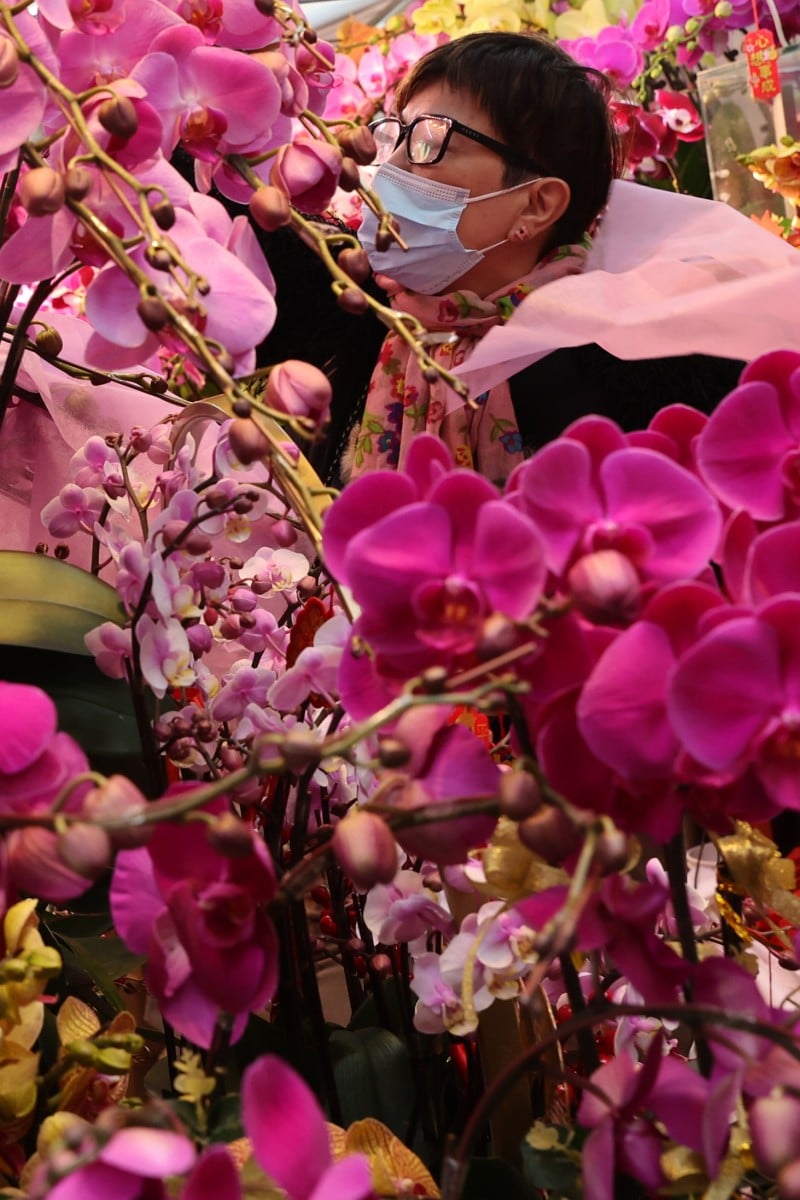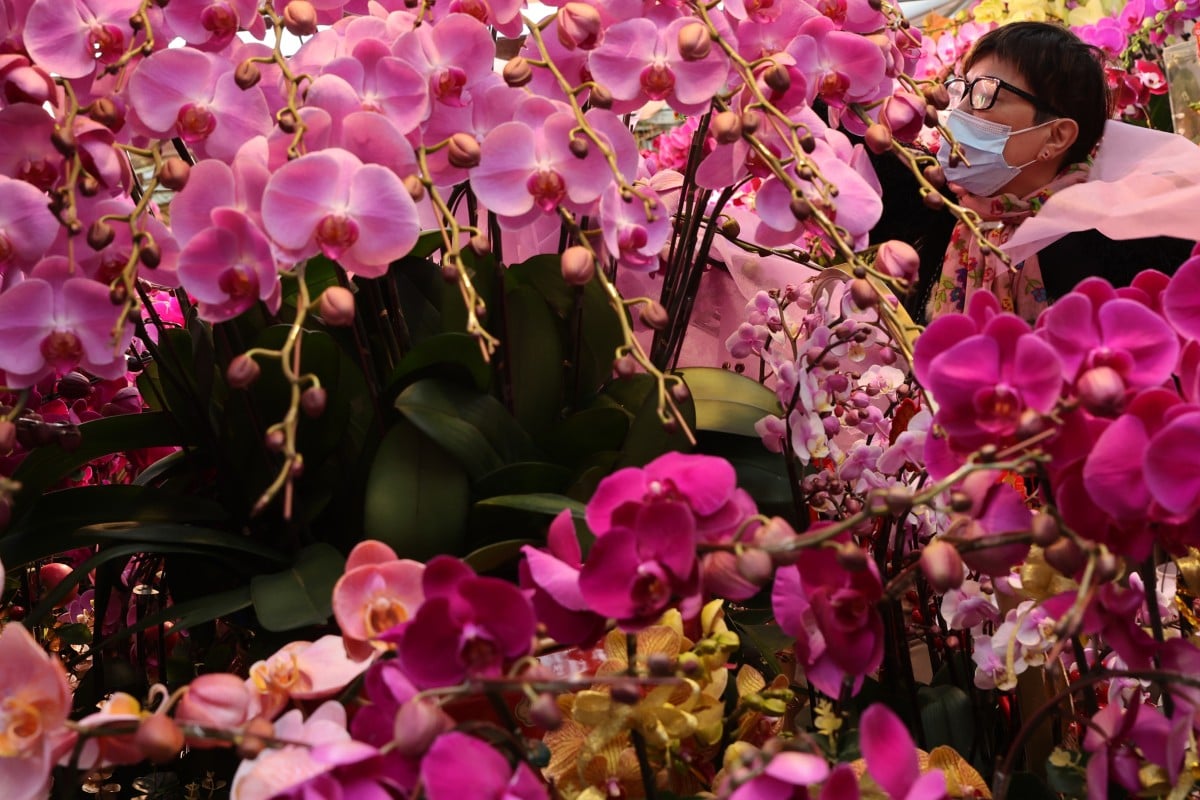
- Weather delays harvest ahead of the Year of the Dragon; output of flowers fit to sell likely to be hit
- Some wholesalers hold out hope as it is the first time the festival will be celebrated after Covid-19 restrictions were lifted
 A cold spell threatens gloom for flower farmers’ sales this Lunar New Year. Photo: Edmond So
A cold spell threatens gloom for flower farmers’ sales this Lunar New Year. Photo: Edmond SoHong Kong is set to celebrate its first Lunar New Year next month since Covid-19 pandemic restrictions have been lifted.
Flower farmer Leung Yat-shun planted his fields of gladioli and lilies last November in hopes of cashing in on the celebrations. But the recent cold weather proved a blow after weeks of dry conditions.
Now, the 72-year-old wholesaler is no longer optimistic about ringing in bumper sales ahead of the Year of the Dragon, which starts on February 10. The weather not only delayed his harvest, but was also likely to shrink the output of flowers fit to sell.
He predicted he would end up with a yield of only 30 per cent of the 100,000 stalks of gladioli and 50,000 stalks of oriental “chill out” lilies he planted, compared with 50 per cent in an average year.
“We rely on the few days of the Lunar New Year each year to earn money for survival. It’s not easy,” he said at his Shun Sum Yuen farm in San Tin, in Yuen Long district.
Putting on a more positive front, Sunny Lai Wing-chun, chairman of the Hong Kong Wholesale Florist Association Limited, said he expected healthy festive sales.
He was counting on residents to remain in the city for the Lunar New Year holiday, as many had already travelled over the Christmas season.
Mechanical flowers project gives students a chance to bloom
For Hong Kong families, buying cut flowers and potted flowering plants is a festive tradition, with people flocking to flower markets to choose pots of peach blossom, narcissus and orchid plants, and fruit-laden mandarin orange trees.
Lai said the average household would spend around HK$800 to HK$1,000 on flowers.
In addition to flower farms and festive exhibitions at major shopping centres, Hongkongers also flock to the popular Prince Edward Flower Market in Mong Kok.
From February 4, the government will put on 15 Lunar New Year fairs across the city, with half the stalls selling flowers.
This year is the first time since 2019 that these flower markets will also have stalls selling a mix of fast food and wet and dry goods. During the pandemic, only flower stalls were allowed.
The largest and most popular one is usually the Victoria Park market in Causeway Bay.
Joel Poinsett: all about the controversial namesake of the poinsettia
Yeung Siu-lun, dubbed the “Orchid King” for running the city’s biggest orchid farm, was expecting sales to go up after the downbeat years of the pandemic.
“Lunar New Year falls later this year, allowing more time to prepare and create a festive atmosphere,” he said. “This is good news for flower farmers.”
The cold weather had little impact on his orchids as they were grown in greenhouses at his sprawling farm in Yuen Long.
His son, Yeung Wan-chun, said artificial intelligence technology was used to control humidity and temperature in the greenhouse flower field.
Farmers without such advanced technology had to rely on themselves and hope for the best when the cold spell arrived.
At Keung Kee Garden in Tai Po, farmer Li Wing-keung was at work until after midnight on Monday, making sure his plants were properly insulated from the cold.
Thai farmer uses cat art to turn rice fields into a tourist attraction
His farm has various plants, including orchids, narcissus and mandarin orange trees.
With two weeks to go before the Lunar New Year, he was hoping for the best. More days of sunlight would help his flowers bloom in time.
“Worrying is useless,” he said.
The Hong Kong Observatory yesterday predicted cool temperatures during mornings and nights over the weekend, with rainy weather in the region early this week.
Over in San Tin, flower farmer Leung could not shake off his worries.
The poor state of the economy might leave Hongkongers watching how much they spend, he said, and some might travel to the mainland to stretch their dollar.
Lai said even florists were getting their supplies from Shenzhen, where farmers had more land, more advanced technology and could sell at lower prices.
“Agriculture in Hong Kong is a sunset industry,” he said with a sigh. “The number of local flower growers is decreasing every single year.”
One Hongkonger who expects there will be fresh flowers at home over the Lunar New Year is engineer Benson Lee, 32. He said his parents usually spent HK$200 to HK$300 for a potted peach blossom that would take pride of place over the festive season.